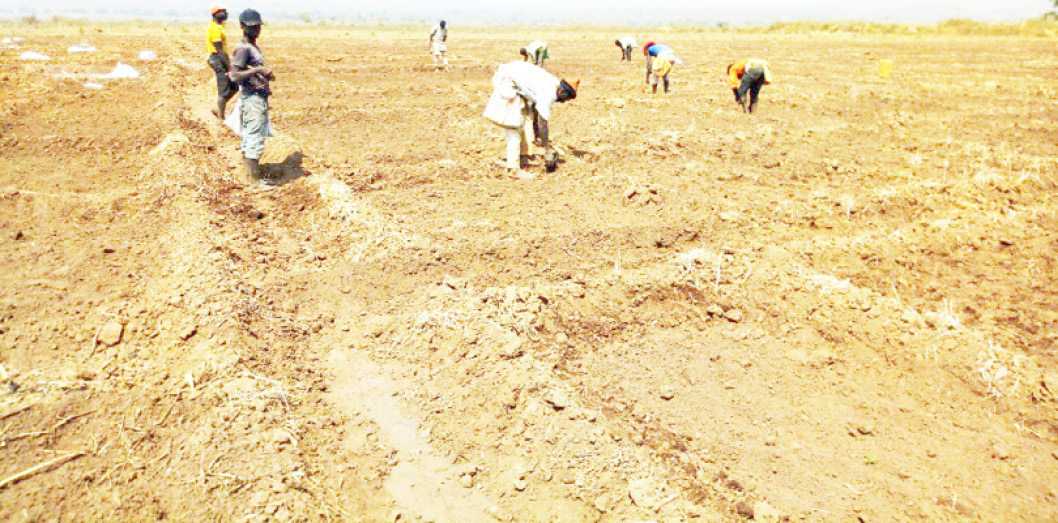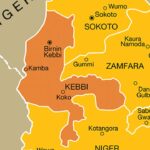For farmers in seven states of the federation, the seasonal rainfall prediction for 2022 raises a red flag that may crumble their crops in the middle of the rain-fed cropping season.
The Nigerian Meteorological Agency (NiMet) last week released its annual rainfall prediction at a time farmers are about to begin crop production.
- NIGERIA DAILY: How Nigerian Politics Will Be Shaken By ‘The Third Force’
- Nigeria needs professionals in fishery technology – Provost
It shows that from May to June 2022, moderate to severe dry spells lasting 15 to 20 days are likely to occur in most states in the North, while mild to moderate dry spells are anticipated in July and August.
Across the country, many states are likely to be affected by mild (less than eight days), moderate (up to15 days) and severe (20 days or more), dry spells.
Farmers in parts of Kebbi, Katsina, Borno, Plateau, Nasarawa Yobe and Jigawa states will face “severe” drought in June this year at a time the crop needs water most for good yield.
The NiMet prediction warned that “a severe dry spell that could persist for 20 days or longer, is predicted to occur in the following places in June 2022:
Places in Kebbi State include Arewa Dandi, Birnin Kebbi, Argungu, and Augie while in Katsina State are places like Kaita, Mashi, Mai’Adua, Katsina, Dutsi, Daura, Baure and Zango.
In Jigawa State the situation is predicted in Gwiwa, Yankwashi, Gumel, Sule-Tankarkar, Guri and Kiri Kasama while in Yobe State, areas like Machina, Nguru, Yusufari, Yunusari, Karasuwa, Barde, Jakusko and Geidam would be affected.
Similar situation is expected in the following towns in Borno: Abadam, Mobbar, Kukawa, Guzamala, Gubio, Nganzai and Monguno.
For Nasarawa State, Awe, Toto and Keana were listed while in neighbouring Plateau State, Langtang South and Kanke are expected to witness the severe dry spell.
A similar situation is also expected in towns in Oyo State between July and August. The towns include Saki, Iseyin, Orelope, Irepo, Atisbo, Iwajowa, Kajola and Ogbomosho.
It said the conditions may also likely affect parts of Benue, Ekiti, Kogi, Nasarawa and Kwara states.
The prediction indicates that signs of the Little Dry Season (LDS) in the South West “may begin to manifest by late July to early August 2022.
Severe LDS that may last up to 25 days or longer is anticipated to affect Lagos and Kwara states, while parts of Ogun, Oyo, Osun and Ekiti states will experience low to moderate LDS that may last 14 to 20 days.”
Professor Mansur Bako Matazu, Director General/CEO of NiMet, reiterated in his comment on the prediction that “these forecasts offer the stakeholders and the general society early warning information for timely preparedness against potential hazards in parts of the country.”
Use drought-tolerant seeds
With this prediction, farmers in the affected areas are strongly advised to use seeds that are tolerant to drought to mitigate the impact to their crops, which is likely to happen at the time it will be fruiting.
It will be recalled that many farmers in the South West were cut unawares when drought destroyed most of their maize and rice in the field.
Mr Joseph Luka, an agronomist with a seed company in Abuja, advised farmers in the areas to adopt technologies that offer tolerance to drought.
“If they use anything else, and the prediction comes through, it will have serious impact on their crops which eventually will affect their yield. Take maize, for example, it will be difficult to recover completely if the rain seizes, and even if it does, the yield will be so poor.
“However, if a farmer has irrigation facilities in his farm, that’s fine, he can continue to water the farm whenever the rain stops, otherwise there is little he can do to save the crop from such weather conditions,” he said.
Climate change has continued to make farmers across sub-Saharan Africa vulnerable and experts said countries need to focus more on climate-resilient agriculture to save smallholder farmers from weather-induced disasters.

 Join Daily Trust WhatsApp Community For Quick Access To News and Happenings Around You.
Join Daily Trust WhatsApp Community For Quick Access To News and Happenings Around You.


